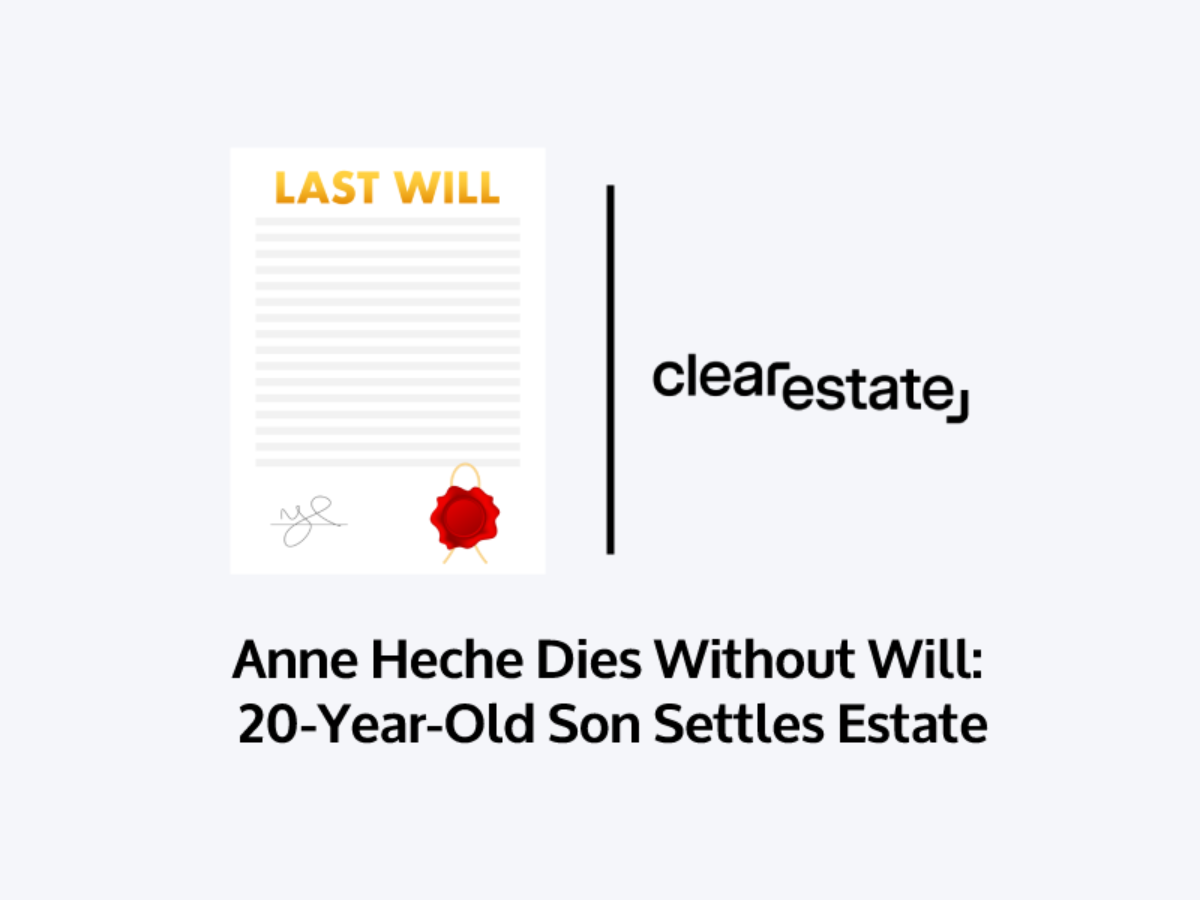Estate Planning
Dec 04, 2024
Should Your Lawyer Be Executor of Your Will? Considerations
Wondering if your attorney can serve as executor? Discover the benefits, challenges, and alternatives in estate planning.
Anne Heche was an icon in the entertainment industry, but tragedy struck when she passed away intestate, leaving her 20-year-old son to settle her estate.


Anne Heche is an award winning actor that has worked her way through Hollywood to become a recognizable face to fans around the world over the span of her thirty year career.
Born in Aurora, Ohio - Anne was raised by her mother and father along with her 5 other siblings. Anne Heche is widely known around the world for her talent in film and television roles, establishing herself as an incredibly versatile actor through comedies such as Six Days Seven Nights as well as serious dramas like Wag the Dog.
Her charitable works include supporting numerous organizations, but she's been heavily invested in highlighting mental health awareness and being an ambassador for research into finding a cure for HIV/AIDS.
Anne Heche's legacy should not only be applauded for bringing laughter, inspiring hope, and creating awareness, but also celebrating an actress who has been determined to share her journey with honesty and courage while providing hope through her portrayal of characters that are genuine reflections of real life.
On August 14th, 2022, the world was shocked by the tragic news that actress Anne Heche had succumbed to her injuries sustained in the devastating car crash on August 5th.
Her sudden and untimely death left her family and fans heartbroken, and even more distressingly, it was revealed she had died without leaving a will. This meant a prolonged legal battle between her surviving family and friends to determine who would administer her estate.
While it's difficult to imagine anyone being able to fill the void Anne Heche left behind with her unique optimism and indefatigable spirit, hopefully, all parties involved can manage their grief and settle things amicably so that she may be remembered for the woman she truly was - vibrant, loving, generous, and caring beyond measure.
The tragedy of Anne Heche's death is compounded by the fact that she died without a will, leaving her family to grapple with the complex process of settling an intestate estate.
With no clear instructions from the deceased about how their property should be distributed, determining who is entitled to receive which assets can quickly become complicated and emotionally exhausting for those left behind.
Without one, her 20-year-old son, Homer, is left to contest not just (somewhat messy) legal matters but also his mother's final wishes, if indeed she had any, as he determines how to handle her estate.
Merely being an entertainment icon and strong mother isn't enough; a will is necessary to ensure that your loved ones are taken care of when they are gone.
Every individual should make sure they have a valid will in place to ensure that their wishes are respected after their passing and that their family members are not unnecessarily burdened with the challenge of untangling an intestate estate.
Anne Heche's tragic and unforeseen death is an important reminder of why everyone should have an estate plan in place. Without one, your wishes may not be carried out after you pass away, and can lead to huge amounts of delays, costs, and potentially - heartache for your loved ones.
An estate plan will ensure that your assets are distributed in accordance with your wishes and that any funds or properties are managed according to your instructions.
Additionally, it will allow you to appoint guardians for minor children if needed, as well as giving you the opportunity to specify how you want to be cared for if you become incapacitated or ill. Having a solid estate plan in place is a crucial step to protect yourself and those around you.
A bulletproof estate plan should include the following elements:
1. A Will: This is a legally binding document that outlines how you want your assets to be distributed after you pass away. It should name an executor who will be responsible for making sure those wishes are respected.
2. Powers of Attorney: These documents provide someone else with legal authority to act on your behalf in the event of incapacitation or illness. They can cover financial decisions and health care choices, depending on the type of document created.
3. Trusts: A trust is a legal entity that can hold assets and dictate how they should be managed and used while you’re alive as well as after you pass away. Trusts are useful because they allow you to make more detailed instructions about property management and ownership than a will allows.
4. Healthcare Directives: Also known as living wills, healthcare directives allow you to give instructions about your medical treatment preferences if you are unable to make decisions yourself due to incapacitation or illness.
5. Account Ownership: Carefully consider how accounts like bank accounts and investments are owned, in order to ensure that any funds held in these accounts can be accessed easily when needed by your designated agent or beneficiary after death or incapacity strikes.
While no one likes to plan for what happens after their death, it is important to take action and ensure that your wishes are respected should something happen.
Anne Heche's story is an important reminder of why everyone should have an estate plan in place so that you can rest easy knowing your loved ones will be taken care of.
Planning ahead can help avoid a lot of stress and emotional turmoil down the line, and make sure that your financial future and the future of those you care about are secure.
If you’d like to create your own comprehensive estate plan, get in touch with our professionals at ClearEstate today.